Happy new year, dear readers! This Labyrinth series has nearly come full circle. I was writing the introduction the day my partner Mark died in late February last year. It was followed by the first step, Encounter, after a visit to Berlin in May, and the second Minotaur from beneath an apple tree in shingle on a high summer. This third step (of four) takes place in winter as the lapwings call again over the marshes, and we face the challenge of finding our way back out.
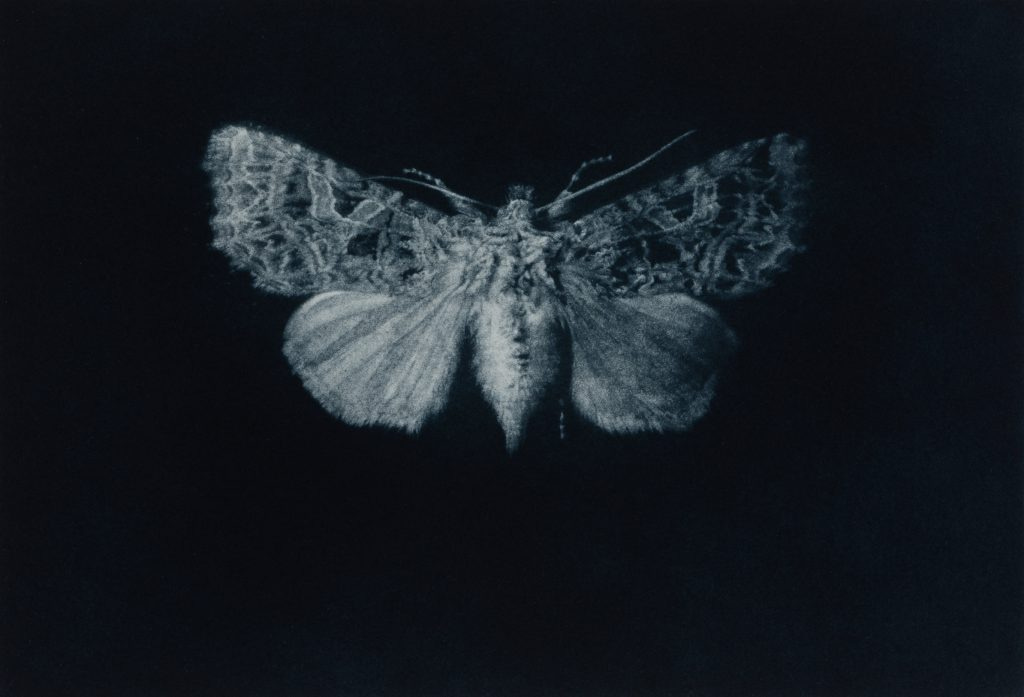
I cannot promise you a good time if you open the door. It was not easy this journey and still it is not. But it is awake. You can’t describe awake. It means you are seeing what is before you, that is not just what is before you. It means that you know who you are and you don’t know where you end. It means you are aware of every action you take and you take a kind of responsibility for life that at times is frustrating and terrifying but most of all it means that when you die you will not have created death behind you: a thousand animals who have died in shame, a thousand cotton shirt workers deprived of a good life, a thousand political prisoners starved of air in lands you have never seen, a thousand trees with a hundred names torn down in your name. It means you are awake to the suffering of others because you are awake to your own. To your own cosmic loneliness, to your common humanity, to this very Earth. It means you will have lived for life itself, and you would have paid the price.
And now you are free to go home.
– The Earth Dreaming Bank ‘Saying Goodbye’
In the late 80s when I first met Mark he introduced me to the languages of metaphysics and the practical ways you could connect with other dimensions beyond the everyday. Curious, like most journalists, I set out find out what they could tell me about the zeitgeist that my magazine attention on Japanese tailoring and New Mexican dishes could not. Sometimes against my own inclination.
One day I woke in a familiar black mood and declared myself depressed. I did not get out of bed. Unlike my friends who indulged me in these doleful states, Mark told me to ring him back when it was over. I was FURIOUS. How dare he! He was supposed to be supportive. Perhaps I would just try one of his damn meditations. and see how that didn’t work out …
But in spite of my annoyance and to my surprise, it did. The moment I took a deep breath and closed my eyes I was plunged into a rich inner landscape, where I could explore and make moves in transformative ways. This wasn’t, of course, a meditation at all, an emptying of the mind, but full scale tip into the ‘right hemisphere’ attention, into the imagination of the living world. An act of perception which later we would call a ‘seeing’, or ‘dreaming’, an ancient iatromantic practice that would become the cornerstone of our own practices and dialogues. After this initial discovery, I began making time for these explorations every day. I found them utterly thrilling in the way all voyagers into other dimensions do. At first. My ‘depressions’ disappeared.
In these adventures there were birds who spoke, and trees who give advice, and each time I asked a question within this ever-changing landscape, an answer would be given in a visual riddle I loved to work out. Afterwards, I would ring Mark and tell him what had happened. What I didn’t know was that these inner journeys were a preparation for an outer one, that would demand leaving a whole fashionable way of life, a city and everything and everybody I knew. Notting Hill Gate was not where I needed to be. Mexico was coming into my dreams.
But if the seeings were liberating, they were also challenging, and heralded a life’s work with Mark that I have in these past months been attempting to collate in this Red Tent metaphysical ‘manual’. In one of these, I plunged into a deep ocean and encountered the god Poseidon, a green and blue flowing force, waiting by an entrance to a underwater cave. There are two journeys he told me, one for men and another for women. At the end of the cave there were two doors. One led to the male journey (Mark’s) and the other the female (my own). You had to go through the challenges of each ‘labyrinth’ and emerge the other side.
The male journey was to pass though a maze of dead ends and repeating loops and not get stuck or distracted. Along the corridors there were rows of fruit machines, dazzling with lights, distorting mirrors, and rooms full of music and colourful images. This was the mind’s journey.
The female territory was a large swimming pool full of toxins. This was the emotional body’s journey. You not only had to wade through the poison, you had to transmute it to get to the other side.
At the time, this sea encounter was just one captivating scenario among many but as I began this post, I remembered this scene, lying in my bath with meaningful pebbles all around me; I remembered how it was at the beginning of things. How exciting those early times were, setting off an adventure with Mark, book contract in hand.
Leaving places is easy when you have somewhere to go, a compañero by your side, a new creative project. The real challenge is when you don’t.
So this post is for the people, like myself now, who realise they don’t have anywhere to go, who feel they have to face a darkness on their own, and don’t have a map to follow. The third journey of the Labyrinth is the hardest, because to go back, like the blue gods, you will have to swallow the poison of the world and transmute it. No one will know you or love you for this alchemical work, but if you don’t meet its challenge we all will continue to wallow in negative emotions, trapped in small rebellious bodies, lost in confusing thoughts.
That’s what you realise as you stand at the door and hesitate: those oppressive feelings, those mind-manacles, those fairground distractions, are not necessarily yours. That this fight for the exit against the flow, is not personal; it’s not really about you and your mythic biography, but your function as an awake being in the ‘nightmare of history’.
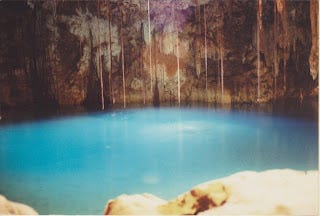
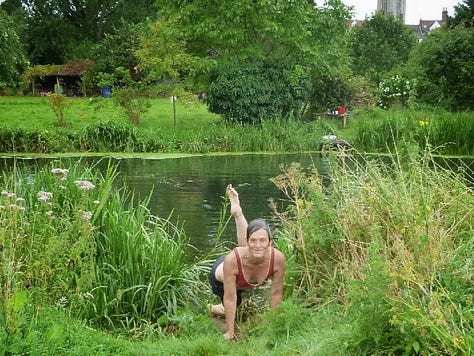
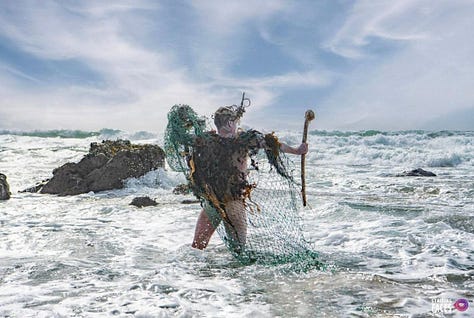
Eel river
Last month I went to the bench on the edge of the marsh and shore I have called my ‘territory’. I was leading a course called Journeys Into Earth and Sea that revolved around the year’s Dark Mountain land-based issues. Like all the courses we have taught, it asked people (including ourselves) to work imaginatively with a local wild or feral place we feel kin to. That week it was my turn to host a session on Dark Ocean, and in preparation, I had asked people to put their feet into a body of water (if not the sea, a nearby lake or river or stream). create a small ceremony of thanks, and to bring back a jar of the water to talk about their experiences. What did that feel like on a freezing winter day? (Some of the participants lived in the frozen North – Alaska and Canada and Minnesota).
The beach was deserted, with the scalding light bouncing off the sea. Low tide. Stiff breeze. I lay down on Mr Meacher’s transfigured ladder, and looked up into the blue sky, whirling with seabirds, thinking about this third step. And that’s when I got it. The metaphor was wrong.
For years I had used the return of the salmon to the source of their native rivers, as a metaphor for the soul’s arduous return against the flow. But the river that flows out here at the Sluice to meet the North Sea, is not a salmon river, full of rushing water and rocks, mythic status and heroic leaps. It’s an eel river. low sluggish, sandy. Its signature fish is not a revered beautiful silvery-flecked being with prized rose-coloured flesh but a long and slippery creature, almost a snake, Bony and common fare, unglamorous. And its migration from between fresh and salt water is utterly different. It begins its life, not poetically in a clear mountain pool, but mysteriously in the Sargasso Sea in the Atlantic, a vast gyre hemmed by ocean currents, blanketed in seaweed and the world’s plastic waste.
For millions of years, the eggs of Northern European eels float thousands of miles across the ocean, changing form as they go, and finally haul up the rivers of Germany, Denmark, England, from February, their tiny glass bodies shining in the moonlight. They come upstream, developing into yellow eels, and live along the river banks and eddies for 12 years or more – and then they go back to the sea to return to the mysterious zone whence they came.
What makes them change their form, to shift into silver? What calls them back? To sally forth from certainty, a place in a small river in England, with its familiar beds and banks, its spiralling sunlight, shapes of waterlilies and heron, to plunge into a vast and dark ocean, and to keep swimming, against the odds, sometimes for over a year?
I take off my boots and wade into the shallows. The waters are churning about. Suddenly, I am taking off my clothes and jumping into the waves. It’s freezing and exciting, and there’s a man now with a dog walking up the beach. I rush out dripping and naked and laughing anyway. ‘I just had to get in,’ I say.
‘Rather you than me,’ he replies nonchalantly, and carries on walking.
Honey in the heart
There’s a moment when you wake up and realise you can’t go to nightclubs anymore, when your travelling days are over, when you find yourself sliding down the kitchen cabinets onto the floor and know certain friendships have run their course. The only way to weather those shifts is to remember the good times, to sing their praises. This is how the heart navigates time, by storing up its sweetness like a bee in its hive.
Last year, when Mark died I wanted to honour his legacy somehow, and so I grew the flowers he loved – sunflowers and violets and mints – and made a small book about his plant practice, and wrote this Substack to record our metaphysical work together. This winter I sorted his boxes of papers, danced to his favourite songs, cooked his favourite meals, kept warm in his brown jumper and bear coat. I sat in front of our photographed notebook lives and remembered everything. Yesterday, battling with the year’s accounts. I found his log of our invoices and expenses, with dates and details meticulously recorded. All there ready for me to file (praises indeed!).
What does the future hold without him, now this work is complete?
‘It’s pretty pointless really,’ said Jane, as we sat in the glass-fronted porch surrounded by her husband’s collection of succulents. For over fifty years they had worked together as botanists and plant lovers, in their travels, in their showcase garden, and now she faced, like me, a future without the partnership that made sense of everything. You can’t really talk about this kind of loss with people unless they have gone through the same experience, which is a big trouble in the world. You can’t properly empathise with anyone else’s exile or loss, if you have never had a partner, or a homeland to lose, until you are faced with the same physical and existential situation. Not just the feelings in your body, but the anguish of spirit, what it feels like in your soul to be left behind, without a purpose, without the prospect of Mexico.
We sat there, side by side, drinking tea, worlds apart socially in many ways but kin in this moment, in the loss of the men we loved, with the plants they loved all around us, the wind outside the door thrashing the silvery leaves of the eucalyptus trees.
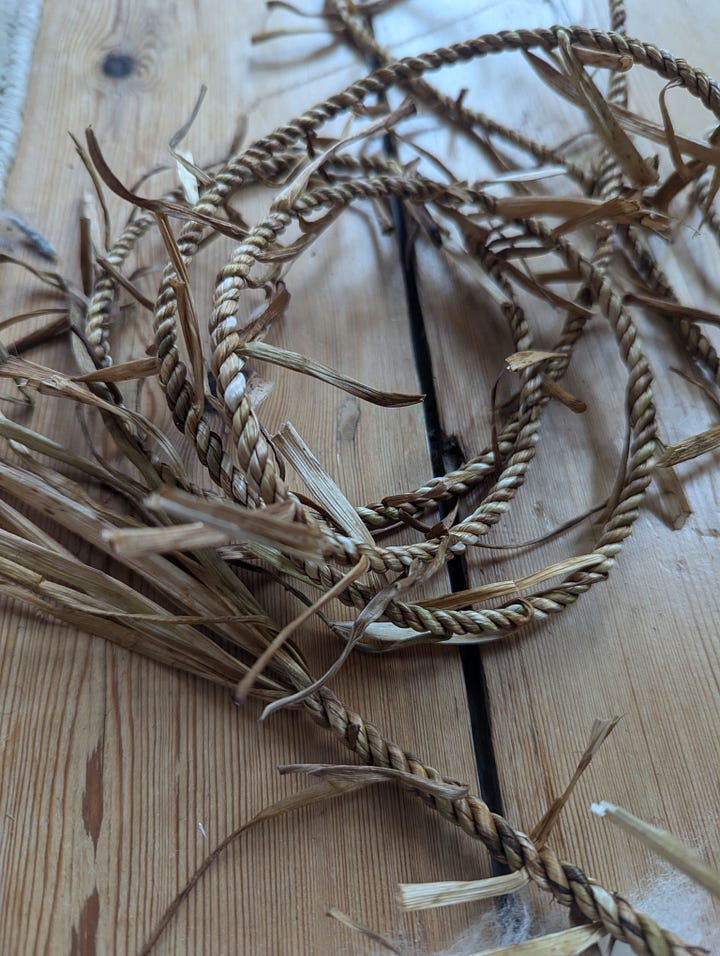

Picnic woods
I was going to write so many things in this post, about a grief ritual for curlews and a gallery in Brighton on a windy night that was closing its doors, about an exiled writer from Chile I once interviewed in Berlin who had so much energy he had to write standing up, but it took another turn. as writing sometimes does. I wanted to give you a map for the return journey, a narrative thread that you might grasp to take you through the swimming pool, the hall of mirrors, that Neptune had gestured all those years ago.
But when I came to the task, what I found in my hands was not an intended set of practices but my own meaninglessness, a not-knowing how to proceed.
And so this step, this post, is really about the doorway moment, when you turn to face what you do not know, which is more do with the how than the what. Because if the ocean is beyond our ken, what we can know, deep in our hearts, is how to go to meet it.
And it’s at this moment I remember the first time I came the woods in Suffolk. I was on exeat from boarding school. It is my twelfth birthday, midsummer’s eve, and my mother has brought a picnic from London to celebrate. It’s beginning to rain, but she is laying out the picnic anyway: it’s not very serious rain, she is saying.
I have often asked myself, why, if the land and the mythic sea of the Aegean spoke so directly to me, if the deserts of America felt so like home, did I end up down a muddy lane in tiny tweedy Britain, with its violent hierarchy, and broken fields. And it’s then that the scent of pine and bracken comes back to me, a tablecloth set on wet grass, a wicker basket beside; how it is in England that self-amusement, that genius of the human heart, is how we bear adversity with a style that makes the gods weep. How when I sat gravely beside my mother when she was dying, she told me: ‘You are not Jesus you know, Charlotte’. And we both roared with laughter.
Sometimes you remember your parents, not in a nostalgic way, but in the spirit they bequeathed you as they were leaving.
‘I like to see you grinning there,’ said my father, as he raised a glass of Pimms and apologised to the doctor for keeping him up. He was meeting his own death, as he did the theatre of the courtroom in life, as a star act. With a summer storm raging outside the hospital window. It’s important to cut a dash, he always said.
You have to know what business you are in, and if you are in the liberation business, the return business, you have know how to face the storm, how to sally forth, how to make the gallery laugh, and yourself. How can I give any kind of instruction unless I am also experiencing what any reader might at the turning point, as your body and mind and soul are tumbled by the gate, as you put your warm feet into icy water, as you leave the party just as you were having a good time.
We live in a civilisation of administrators, telling people across desks, from pulpits and platforms, in letters in brown envelopes, what to do about lives they know nothing about and care less, instructing them to move forward, look up, pull together , whilst comfortably inured against the same circumstance. So I cannot write about the Labyrinth from a safe and secure position, with guarantees for a feast at the end. We have to make our own threads because each person’s journey is shaped by their own personal and cultural ‘ledger’. We just need to know the way into the Labyrinth is not same as the way back. It goes by a different route.
When Mark and I walked out of the pink hotel in Palenque in 1990, I knew our lives would not be the same again. We had glimpsed the Earth in all its magnificence but also been given an obligation towards it. The way back is always hard because your feet remember the dancing floor, how it felt to be connected to everything; hard because now, as you trace yourself back through time, you are aware of the sacrifice this civilisation demands to upkeep it dominance, not just from your human form, but from all beings, their hearts, their bodies, their very lifeforce and intelligence, and somehow your capacity to make it home, through these twisted passageways and horror shows, will help break its bondage.
So it is not in sorrow, nor in despair, but with the joyful memories of all the summers in the river that I enter the churning waters at the Sluice. Con brio. Because among many things, life is a picnic and the rain is not always serious. Because you need to make the gallery, your dying parents, laugh. Because all good comedies end in a dance.
Come what may.





Beautiful writing! Awake beings in the nightmare of history, indeed … It reminds me of Wendell Berry’s OUR REAL WORK:
It may be that when we no longer know what to do
we have come to our real work,
and that when we no longer know which way to go
we have come to our real journey.
The mind that is not baffled is not employed.
The impeded stream is the one that sings.
Thanks for this Charlotte. As ever plenty to chew over… it reminded me of this poem which always makes me laugh
The Committee Weighs In
I tell my mother
I’ve won the Nobel Prize.
Again? she says. Which
discipline this time?
It’s a little game
we play: I pretend
I’m somebody, she
pretends she isn’t dead.
—Andrea Cohen
Sending love and squeezing spagnum moss on the hill between my toes. Cally